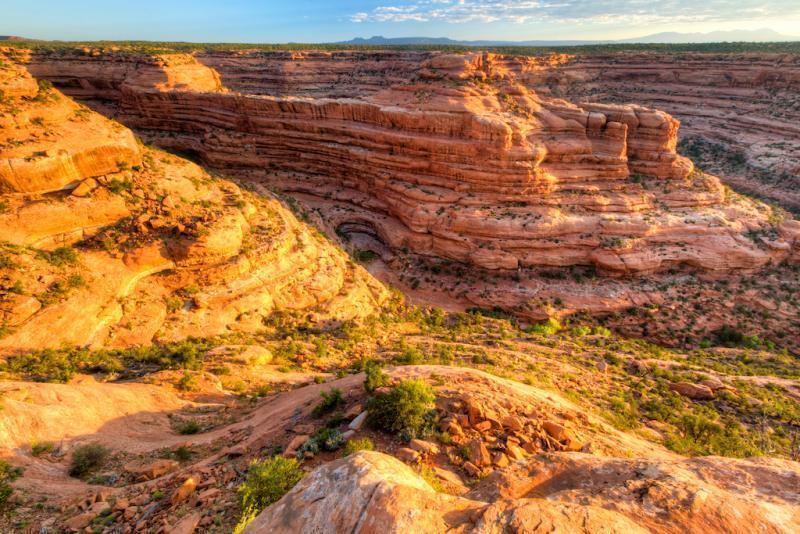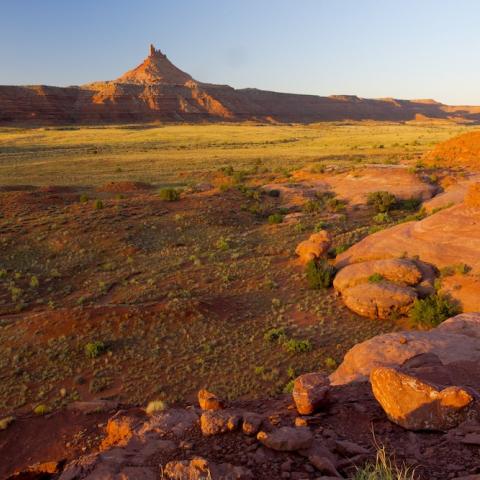
Legislation has been introduced to the House of Representatives to end the president's authority to establish national monuments, such as Bears Ears in Utah/BLM
Legislation was introduced Thursday in the U.S. House of Representatives to strip presidents of their authority under The Antiquities Act to designate national monuments.
The measure, introduced by Reps. Celeste Maloy, R-Utah, and Mark Amodei, R-Nevada, would rewrite the act to say only Congress has the authority to designate national monuments.
“Congress, not the executive branch, has jurisdiction to make decisions on public land,” said Rep. Maloy. “Congress trusted Presidents with a narrow authority to declare national monuments in the Antiquities Act. Unfortunately, Presidents have continued to abuse that narrow authority to designate millions of acres of land in Utah and across the West without proper Congressional oversight. My bill aims to rebalance the powers between Congress and the executive branch and restore transparency and accountability to these designations.”
The move was immediately criticized.
“The Antiquities Act has played a pivotal role in our country’s history, and in the history of the National Park Service," said Phil Francis, who spent more than four decades with the Park Service and now chairs the Coalition to Protect America's National Parks. "The National Park Service manages over 100 parks that were designated thanks to The Antiquities Act, including well-known national parks such as Acadia, Carlsbad Caverns, Grand Canyon, and Olympic. Today, these places are integral to our national identity and are hugely popular sites within the National Park System."
At Earthjustice, a nonprofit law firm focused on environmental issues, Senior Legislative Representative Blaine Miller-McFeeley said Maloy and Amodei were carrying water for industry.
"For over a century, Congress and the courts have upheld The Antiquities Act and allowed both Republican and Democratic presidents to protect iconic landscapes, historic places, and cultural sites enjoyed by millions of people every year,” said Miller-McFeeley. “Industry has sought to slash land protections for decades. Their congressional allies are now working to make that dream a reality by introducing unpopular legislation that would open the floodgates for polluting industries to carve up beloved and sacred protected spaces for the sake of profit. We will fight attempts both inside and outside of Congress that threaten our ability to protect special places for the benefit of the American people.”
Congress passed the act and President Theodore Roosevelt signed it into law in 1906. At the time it was seen as necessary to protect cultural resources in the Southwest from "pot hunters" and others seeking to enrich themselves through the sale of "antiquities" from long ago cultures.
But through the decades, the act also has been used to protect areas not entirely viewed as scientific or historic: Fort Monroe National Monument or Belmont-Paul Women's Equality National Monument, for example. According to the Coalition, 18 presidents — nine Democratic and nine Republican — have established or expanded more than 160 national monuments.
Francis pointed out that the creation of national monuments can deliver an economic impact to surrounding communities.
"For example, at Great Basin National Park in Nevada’s 2nd Congressional District — which was first protected as Lehman Caves National Monument — 143,000 park visitors spent an estimated $15.4 million in local gateway regions while visiting the park in 2023. At Zion National Park in Utah’s 2nd Congressional District — which was also first protected under the Antiquities Act — 4.6 million park visitors spent an estimated $676 million in local gateway regions while visiting the park in 2023," he said.
Amodei disagreed with Francis' viewpoint.
"My home state of Nevada, along with other Western states, has long been burned by executive actions on public lands and monument designations that bypass input from Congress and local governments," he said. "I am a firm believer that the best lands policy is generated by the local communities who actually live off of these lands, not Washington bureaucrats. This legislation overturns years of a one-sided approach on major land management decisions and ensures Western communities are given a seat at the table for any future monument designations."
At The Wilderness Society, Southwest Senior Regional Director Scott Miller said the “bill is part of a larger political effort to dispose of our cherished federal public lands. The bill, following on the heels of the anti-public-land lawsuit in Utah, plays a role in a coordinated plan to gut the Antiquities Act, revoke our beloved national monuments, then sell off the newly undesignated land."
Through the decades there long have been political disagreements over how presidents used The Antiquities Act. In 1950, Wyoming's congressional delegation, furious over the establishement of a national monument that would be added to Grand Teton National Park, saw the act amended to require Congressional approval for any new monuments in the Cowboy State, and in 1980 the Alaska National Interest Lands Conservation Act specified that Congressional approval would be needed for any future national monument over 5,000 acres created within Alaska.
In 2017, then-President Trump, arguing that Presidents Clinton and Obama both were overreaching when they created Grand Staircase-Escalante National Monument (Clinton) and Bears Ears National Monument (Obama), sliced a combined 2 million acres from the two monuments. A management plan adopted by the Bureau of Land Management would have allowed energy development and other multiple-use activities in the 2 million acres. However, when President Biden took office he reversed Trump's actions.


 Support Essential Coverage of Essential Places
Support Essential Coverage of Essential Places






